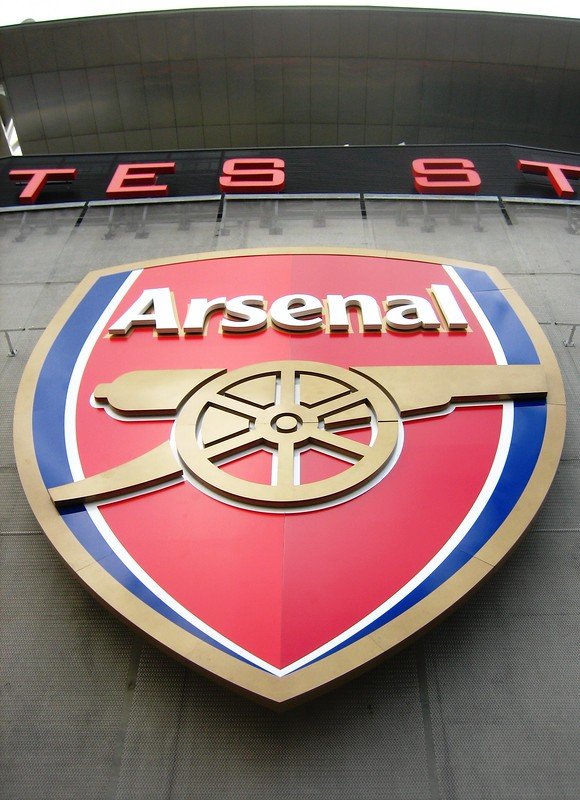
“arsenal club” By Kieran Lynam, Source is Licensed under CC BY 2.0
Arsenal Football Club: A Legacy of Triumphs
Introduction
Arsenal Football Club, affectionately known as Arsenal, commands a towering presence in the realm of football. It was forged in 1886 by the hands of laborers from the Woolwich Arsenal Armament Factory in South London. Since then, Arsenal’s journey has been marked by triumphs, innovations, and an unwavering tide of fan support.
The Formative Years and Evolution
From its humble origins as “Dial Square,” the club underwent several transformations, eventually settling as “Woolwich Arsenal” in 1893. The pivotal decision in 1913 to shift the club to North London, specifically to the revered Highbury area, heralded a new epoch both geographically and in the club’s identity.
Challenges
Arsenal Football Club, with its rich history and numerous triumphs, has encountered its fair share of obstacles and trials. These tests of mettle have not only shaped the club’s character but also underscored the unwavering support of its dedicated fan base. Here, we delve into the significant challenges that Arsenal has confronted over the years.
The Chapman Era: A Dawn of Success
The 1920s ushered in Herbert Chapman, a visionary manager whose innovative tactics and strategic brilliance propelled Arsenal to unprecedented heights. Under his astute leadership, the club secured its maiden major trophies, including two First Division titles and the revered FA Cup in 1930.
Post-Chapman Years: Nurturing Greatness
After Chapman’s passing in 1934, George Allison took the helm and continued to steer Arsenal towards further glory. The 1930s shone as a golden era, with the club clinching an impressive five league titles and two FA Cups.
The 1970s: A Renaissance Period
Under the stewardship of Bertie Mee and later Terry Neill, the 1970s marked a renaissance for Arsenal. The apex of this era was the historic 1970-71 season, where Arsenal accomplished the rare feat of securing both the First Division title and the FA Cup.
Wenger’s Revolution: A New Horizon
In 1996, Arsène Wenger ushered in a new era for Arsenal. His revolutionary training methodologies and emphasis on sports science transformed English football. The club achieved unprecedented success, clinching three Premier League titles and four FA Cups under his tenure.
The Invincibles: An Unparalleled Feat
The 2003-2004 season etched Arsenal into football’s annals of history. They clinched the Premier League title without a single defeat, earning them the moniker “The Invincibles.”
International Glory and Modern Arsenal
Arsenal’s impact transcends English borders. The club has left an indelible mark in international competitions, including triumphant campaigns in the UEFA Cup Winners’ Cup and the UEFA Champions League.
In the contemporary landscape, Arsenal Football Club remains a stalwart force in English football, embraced by a global fanbase. Their legacy extends beyond trophies, encompassing an unwavering commitment to exhilarating, attacking football and the nurturing of emerging talent.
The saga of Arsenal is one of ardor, innovation, and steadfast devotion. It unfolds with each match, each goal, and each triumph, affirming Arsenal’s enduring place in the pantheon of football legends.
History

The Rich Legacy of Arsenal Football Club
Arsenal Football Club, fondly known as Arsenal, holds an illustrious history in the realm of football. Its inception traces back to 1886 when it was established by a group of laborers at the Woolwich Arsenal Armament Factory in South London. Initially named “Dial Square,” the club underwent several moniker changes, settling as “Woolwich Arsenal” in 1893.
Relocation and New Beginnings
In a pivotal move in 1913, Arsenal shifted its base to North London, specifically to the vibrant Highbury area. This strategic transition was driven by financial considerations and burgeoning support from the local community, marking a significant turning point in the club’s trajectory.
The Chapman Era: A Golden Epoch
Under the astute guidance of Herbert Chapman during the 1920s, Arsenal basked in a period of unparalleled triumph. Chapman’s visionary strategies and tactical acumen propelled the club to secure its initial major accolades, including two First Division titles and the coveted FA Cup in 1930.
The Allison Continuation: Further Glories
Following Chapman’s untimely demise in 1934, George Allison stepped into his shoes, carrying forth the legacy. Under his stewardship, Arsenal continued to scale new heights, clinching five league titles and two FA Cups during the dynamic 1930s.
Resurgence in the 1970s
Under the watchful eyes of Bertie Mee and later Terry Neill in the 1970s, Arsenal experienced a renaissance. The pinnacle of this era was the historic double-winning season of 1970-71, when Arsenal triumphed in both the First Division and the FA Cup.
Wenger’s Revolution
However, it was under the transformative management of Arsène Wenger in 1996 that Arsenal ascended to unprecedented heights. Wenger revolutionized English football through groundbreaking training methodologies and a focus on sports science. The club garnered remarkable success, securing three Premier League titles and four FA Cups.
The Invincibles: A Legendary Feat
One of Arsenal’s most iconic achievements unfolded in the 2003-2004 season when they clinched the Premier League title without suffering a single defeat, earning them the moniker “The Invincibles.”
International Glory
Arsenal’s history is not confined to domestic success. The club has left an indelible mark on the international stage, triumphing in competitions like the UEFA Cup Winners’ Cup and the UEFA Champions League.
Today’s Arsenal
In contemporary times, Arsenal Football Club stands as one of the foremost and widely supported clubs in English football. Their legacy is not solely defined by their extensive trophy cabinet, but also by their steadfast commitment to exhilarating, attacking football and the nurturing of young talent.
Challenges and struggles

Arsenal Football Club: Navigating Challenges and Struggles
Financial Tightrope
One of Arsenal’s enduring challenges revolves around financial constraints. The intricate dance of securing competitive player acquisitions while maintaining fiscal prudence in an increasingly inflated transfer market has proven to be a demanding feat. At times, this balancing act has imposed limitations on acquiring top-tier talent and retaining key assets.
Transition Phases: A Natural Progression
Like all football clubs, Arsenal has weathered transitional periods. These junctures often coincide with changes in managerial leadership, potentially disrupting team dynamics. It necessitates time for players to acclimate to new tactics and strategies, a process vital for sustained success.
The Emirates Shift: Financial Evolution
The pivotal move from the revered Highbury to the Emirates Stadium in 2006, while ultimately pivotal for long-term financial stability, introduced initial fiscal challenges and an adjustment period. The transition to a larger stadium demanded meticulous financial management to safeguard the club’s ongoing competitiveness.
Player Retention Struggles
Arsenal has grappled with retaining key players on occasion. The allure of more substantial contracts and the promise of immediate success elsewhere have, at times, led to the departure of invaluable assets. This, in turn, necessitates a rebuilding process and adaptive strategies.
Trophy Droughts: A Test of Patience
Despite consistently clinching top-four finishes in the Premier League, Arsenal endured a notable trophy drought from 2005 to 2014. This period of silverware scarcity was a source of frustration for fans and intensified the pressure on the club to secure major honors.
Defensive Stability Challenges
In recent years, Arsenal has faced challenges in maintaining consistent defensive stability. Defensive lapses and vulnerabilities have occasionally hindered the team’s progress in competitions, underscoring the need for tactical adjustments and player development.
The Rigors of Premier League Competition
The Premier League is renowned for its fierce competition, with several clubs boasting substantial financial resources. Navigating this highly competitive landscape has been an enduring challenge for Arsenal, necessitating strategic acquisitions and astute squad management.
Meeting High Expectations
As one of English football’s traditional “Big Six” clubs, Arsenal is held to lofty expectations from fans, media, and stakeholders alike. Meeting these expectations, especially in the midst of intense competition, places significant pressure on the club’s shoulders.
Conclusion: Arsenal’s Resilience and Commitment
Despite these challenges, Arsenal Football Club has displayed remarkable resilience and an unwavering dedication to its core values. The club’s ability to surmount these hurdles stands as a testament to the unwavering dedication of its management, players, and the enduring support of its fan base. As Arsenal forges ahead into the future, it does so armed with the knowledge that overcoming challenges is an integral part of its illustrious history.
Renaissance Period of Arsenal

The Arsenal Renaissance: A Glorious Decade
The 1970s witnessed an extraordinary renaissance for Arsenal Football Club, a period that revitalized and left an indelible mark on the club’s storied history. Guided by the astute leadership of managers Bertie Mee and later Terry Neill, Arsenal experienced a golden era marked by significant achievements and unforgettable moments.
A Decade of Exceptionalism
During this transformative decade, Arsenal exhibited exceptional skill, remarkable teamwork, and unyielding determination. Their performances captivated fans and elevated the club to a prominent position in English football. The pinnacle of this era arrived in the 1970-71 season, a season that would forever be etched in the annals of Arsenal’s illustrious history.
The Double Triumph
In that historic season, Arsenal achieved an extraordinary feat by clinching both the First Division title and the FA Cup. This double triumph not only solidified Arsenal’s status as a dominant force in English football but also ignited an unparalleled sense of pride among the club’s dedicated fan base.
Beyond Trophies: A Style to Admire
The success of the 1970s extended beyond the silverware. Arsenal’s style of play and the camaraderie among its players garnered admiration from football enthusiasts worldwide. The club showcased a brand of football that was not only skillful but also deeply entertaining.
Icons of an Era
Players like Frank McLintock, Charlie George, and Bob Wilson became household names, embodying the spirit and dedication that defined Arsenal during this golden era. Their contributions on the pitch were matched only by their unwavering passion for the club and its enduring legacy.
Conquering Europe
The 1970s witnessed Arsenal’s ascent not only on the domestic stage but also on the European platform. The club’s performances in various European competitions further solidified its reputation as a formidable force in international football.
A Testament to Resilience
Looking back, the 1970s stand as a testament to the resilience, skill, and unity of Arsenal Football Club. It was a period that showcased the club’s ability to surmount challenges and emerge stronger than ever.
Inspiring Future Generations
The achievements of this decade continue to inspire current generations of Arsenal players and fans, reminding them of the club’s rich history and its boundless potential for greatness.
Embracing the Future
As Arsenal sets its sights on the future, it does so with the knowledge that the spirit of the 1970s remains an enduring source of inspiration. It serves as a reminder of what can be achieved through determination, teamwork, and unwavering dedication to the beautiful game.
A Timeless Legacy
The renaissance period of the 1970s will forever hold a special place in the heart of every Arsenal supporter, serving as a testament to the enduring legacy of this iconic football club.
Achievements

Arsenal Football Club: A Legacy of Triumphs
Arsenal Football Club, founded in 1886, has carved its name deep into the annals of football history. With an esteemed tradition and an ardent global fan base, the club’s legacy serves as a testament to its enduring excellence.
Pinnacle of English Football: League Titles
Arsenal’s dominance in English football is exemplified by their 13 top-tier league titles. The club’s success story traces back to the early 1930s, marked by their inaugural league triumphs under the astute management of Herbert Chapman. This legacy extended into the modern era, clinching three Premier League titles in the late 1990s and early 2000s, firmly establishing Arsenal as a formidable force.
Tradition and Prestige: FA Cup Glory
The FA Cup, steeped in tradition and prestige, has been a particularly bountiful realm for Arsenal. With a record 14 FA Cup victories, the club displayed an uncanny ability to rise to the occasion in this hallowed competition. These triumphs not only enriched Arsenal’s illustrious collection of silverware but also etched unforgettable moments in the hearts of fans worldwide.
A Feat for the Ages: The Invincible Season
The 2003-2004 Premier League campaign remains one of Arsenal’s most iconic achievements. Coined “The Invincibles,” Arsenal secured the league title without suffering a single defeat. This unparalleled feat, unprecedented since the 19th century, firmly established Arsenal in football history, showcasing their unrivaled consistency and prowess.
A Quest for Glory: European Endeavors
While Arsenal’s European conquests may not parallel their domestic triumphs, the club has nonetheless made significant strides on the continental stage. The crowning moment arrived in 1970-1971 when Arsenal reached the final of the UEFA Cup Winners’ Cup, a feat that underscored their prowess in European competition.
Beyond Borders: International Impact
Arsenal’s influence transcends English shores, boasting a dedicated fan base that spans the globe, from North London to distant continents. This global following attests to Arsenal’s stature as a true footballing giant with an international resonance.
A New Chapter: The Emirates Era
The transition from Highbury to the Emirates Stadium in 2006 marked a significant milestone in Arsenal’s history. While initially met with financial challenges, this shift paved the way for a new era of sustainability and competitiveness. The Emirates Stadium, with its state-of-the-art facilities, has become a fitting home for a club of Arsenal’s stature.
Nurturing Tomorrow’s Stars: Youth Development
Arsenal’s commitment to youth development has been a cornerstone of the club’s philosophy. The Arsenal Academy has yielded a steady stream of talent, with players like Jack Wilshere, Ashley Cole, and Bukayo Saka ascending through the ranks to become integral parts of both the club and the national team.
Impact Beyond the Pitch: Community Engagement
Beyond the confines of the pitch, Arsenal Football Club has been actively engaged in various community initiatives. Through Arsenal in the Community, the club has made substantial contributions to local neighborhoods, focusing on areas such as education, health, and social inclusion. This dedication to community well-being exemplifies Arsenal’s commitment to making a positive impact beyond the realm of football.
The Heartbeat of Arsenal: Unwavering Fan Support
Central to Arsenal’s success story is the steadfast support of its fans. The Emirates Stadium reverberates with the chants and cheers of the Arsenal faithful, creating an atmosphere that has become the envy of many. This passionate support, whether at home or away, embodies the true spirit of Arsenal Football Club.
Conclusion: A Legacy to Cherish
Arsenal’s achievements represent a legacy of excellence in football. From historic league triumphs to unforgettable cup runs, the club’s storied history is a testament to the dedication, skill, and passion that define Arsenal Football Club. As the club looks ahead, it does so with the knowledge that its remarkable journey is far from over, and the promise of future successes looms on the horizon.
FAQ
What is Arsenal Football Club?
- Arsenal Football Club is a professional football (soccer) club based in London, England.
When was Arsenal Football Club founded?
- Arsenal FC was founded in 1886 in Woolwich, South East London, and later moved to Highbury in 1913 and then to its current stadium, the Emirates Stadium, in 2006.
What is Arsenal’s nickname?
- Arsenal is commonly referred to as “The Gunners.”
What are the team colors of Arsenal FC?
- Arsenal’s traditional colors are red and white, and their home kit usually consists of a red shirt with white sleeves, white shorts, and red socks.
Which league does Arsenal play in?
- Arsenal competes in the English Premier League (EPL), the top tier of English football.
What is Arsenal’s home stadium?
- Arsenal’s home ground is the Emirates Stadium, located in Holloway, North London. It has a seating capacity of over 60,000.
Who are some of Arsenal’s famous players?
- Arsenal has had many notable players throughout its history, including Thierry Henry, Dennis Bergkamp, Tony Adams, Patrick Vieira, Ian Wright, and many others.
Has Arsenal won any major trophies?
- Yes, Arsenal has a rich history of success, having won multiple league titles, including the English First Division/Premier League titles and FA Cups.
Who is the current manager of Arsenal FC?
- As of my last update, the manager of Arsenal FC was Mikel Arteta. However, please check for the latest information as managerial changes can occur.
What is Arsenal’s playing style or philosophy?
- Arsenal has historically been associated with a style of play emphasizing possession, attacking football, and technical skill, known as “The Arsenal Way.”
Has Arsenal ever gone unbeaten in a Premier League season?
- Yes, Arsenal famously went unbeaten throughout the entire 2003-2004 Premier League season, earning the nickname “The Invincibles.”
Does Arsenal have a youth academy?
- Yes, Arsenal has a renowned youth academy known for producing talented players, some of whom have gone on to become first-team regulars.
What are Arsenal’s fiercest rivalries?
- Arsenal has significant rivalries, notably with Tottenham Hotspur (North London Derby) and other London-based clubs.
Is Arsenal involved in community and charitable activities?
- Yes, Arsenal is involved in various community and charitable initiatives, supporting local causes and engaging in social responsibility programs.
How can fans stay updated on Arsenal’s news and matches?
- Fans can follow Arsenal’s official website, social media accounts, and various sports news outlets for the latest updates, news, and match schedules.
